A MAN WITH A PLAN
MALTA’S FINTECH BOOM AND ITS EMERGENCIES
FTX WAS EVERYTHING THAT CRYPTO IS NOT

ISSUE 75 BUSINESS | LIFESTYLE | DESIGN THE FINANCE EDITION
Chris Meilak / 32
2023
Joshua Ellul / 26
ECONOMIC OUTLOOK
Adrian Galea / 22
Kenneth Farrugia / 08
Liquidity Management Accounts - giving you the power
Overnight
Our suite of services are geared to support our customers with their banking requirements allowing access to world markets, interest rates and foreign exchange services - a personalised service through one relationship.

Speak
T:
E: PrivateBanking@sparkasse-bank-malta.com
Sparkasse Bank Malta plc, 101 Townsquare, Ix-Xatt ta’ Qui-si-Sana, Sliema SLM3112, Malta.
Sparkasse Bank Malta plc is a public limited liability company registered in Malta with registration number C27152 and registered office at 101 Townsquare, Ix-Xatt ta’ Qui-si-Sana, Sliema SLM3112, Malta. Sparkasse Bank Malta plc is licensed by the Malta Financial Services Authority to carry out the business of banking in terms of the Banking Act (Cap. 371 of the Laws of Malta), and to provide investment services and custody and depositary services in terms of the Investment Services Act (Cap. 370 of the Laws of Malta).
to manage your liquidity.
an advisor today.
to
our
to
you in optimising
deposits for professional customers -
goal is
support
your returns.

Banking | Custody | Investments Banking Investments - a personalised service through one relationship.
Although this is the finance edition of the magazine, you will notice that the omnipresent subject of sustainability is threaded throughout the interviews and articles because it has become an ingrained topic with most business issues.
While you’re reading this magazine, the annual World Economic Forum (WEF) meeting held in Davos, Switzerland, would have taken place as heads of state and government, cabinet ministers, and business leaders gathered to discuss the most pressing issues facing the world today, under the theme “Cooperation in a fragmented world.”
This group of influential people will be discussing topics such as the cost of living crisis, the ongoing war in Ukraine, climate change and the threats that it brings, and the infiltration of technology into our everyday lives, leading to what many call the “Fourth Industrial Revolution.”
On a local scale, Vanessa Macdonald’s interview with BOV CEO Kenneth Farrugia touches upon some of these topics, with the CEO stating that the bank’s ethos revolves around innovation to help the customer while keeping ESGs at the forefront of their initiatives.
On an academic level, a lot is being done in the research areas of renewable energy, sustainability, and artificial intelligence, according to Wilfred Kenely of the Research, Innovation, and Development Trust (RIDT). But once again, the word “sustainability” marks its territory as an important part of talk and action.
Business leaders know their companies’ impact on the earth, especially those that operate at the corporation level, emitting high emissions through technology usage, operations and supply chains, and even their human resources.
Therefore, they must reduce their environmental impact and promote sustainability. As a result, we see companies transition to renewable energy sources, implement energy-efficient measures, and reduce waste overall. The longerterm solution is to develop and implement new technologies and products to help mitigate climate change.
You cannot speak about finance without talking about cryptocurrency. The rise and fall of FTX, once dubbed “one of the safest buildings in crypto”, and the decline in the cryptocurrency market cap have people speculating about the future and stability of the digital exchange.
We get the point of view of Ken Goodwin, an adjunct professor on the Economics of Digital Assets, about “the cryptocurrency rollercoaster”, a topic that was also on the Davos agenda as the crypto companies made their presence known,
although in a more subdued manner to their past appearances. Possibly due to the FTX fiasco.

On page 26, Professor Joshua Ellul also has his say about the FTX saga, pointing out that regulation and blockchain offer a solution to situations where people are lacking in the trust game. Cryptocurrencies have blended into the fintech space, slowly losing their garish influence and taking on a more sombre and serious role.
On this note, the fintech industry in Malta remains prevalent (despite the Blockchain Island flop), with the regulator seeking measures to attract fintech companies to Malta – based on solid regulatory procedures. While Adrian Galea elaborates on this point, Jordan Portelli questions whether Malta’s attractiveness is at risk. Meanwhile, industry veteran Chris Meilak focuses on Malta’s 2023 economic outlook, which mirrors the issues discussed in Davos.
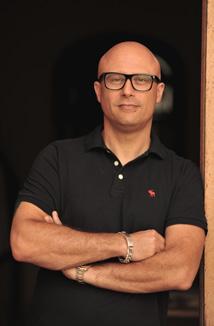
With a whole host of issues plaguing 2023 from its onset, we need to take note of the impact that we create in the world and its repercussions – and do something positive about it… because sustainability is the keyword that’s going to be around for a while longer.
Wishing you all an awesome year ahead!
MONEY is hand-delivered to Malta’s businesses, including managers and directors of the country’s top bluechip companies, iGaming companies, all 5-star hotels, including their business centres, executive lounges and rooms (where allowed), all foreign embassies and Maltese embassies abroad (the UK, Rome, Brussels and Moscow). All government ministries and entities.
For information regarding promotion and advertising: [bemags.com/money-pitch] · [hello@bemags.com]
All rights reserved. Reproduction in whole or in part is strictly prohibited without written permission. Opinions expressed in Money are not necessarily those of the editor or publisher. All reasonable care is taken to ensure truth and accuracy, but the editor and publishers cannot be held responsible for errors or omissions in articles, advertising, photographs or illustrations. Unsolicited manuscripts are welcome but cannot be returned without a stamped, self-addressed envelope. The editor is not responsible for material submitted for consideration.

ISSUE 75 MONEY 04 WELCOME
Money is published by Be Communications Ltd, No. 81, Howard Street, Sliema, Malta SLM 1754 FACEBOOK-SQUARE LINKEDIN · [becommunications.com]
PRINTING Print It DESIGN BeCommunications DISTRIBUTION JD Distributors
EDITOR Anthony P. Bernard
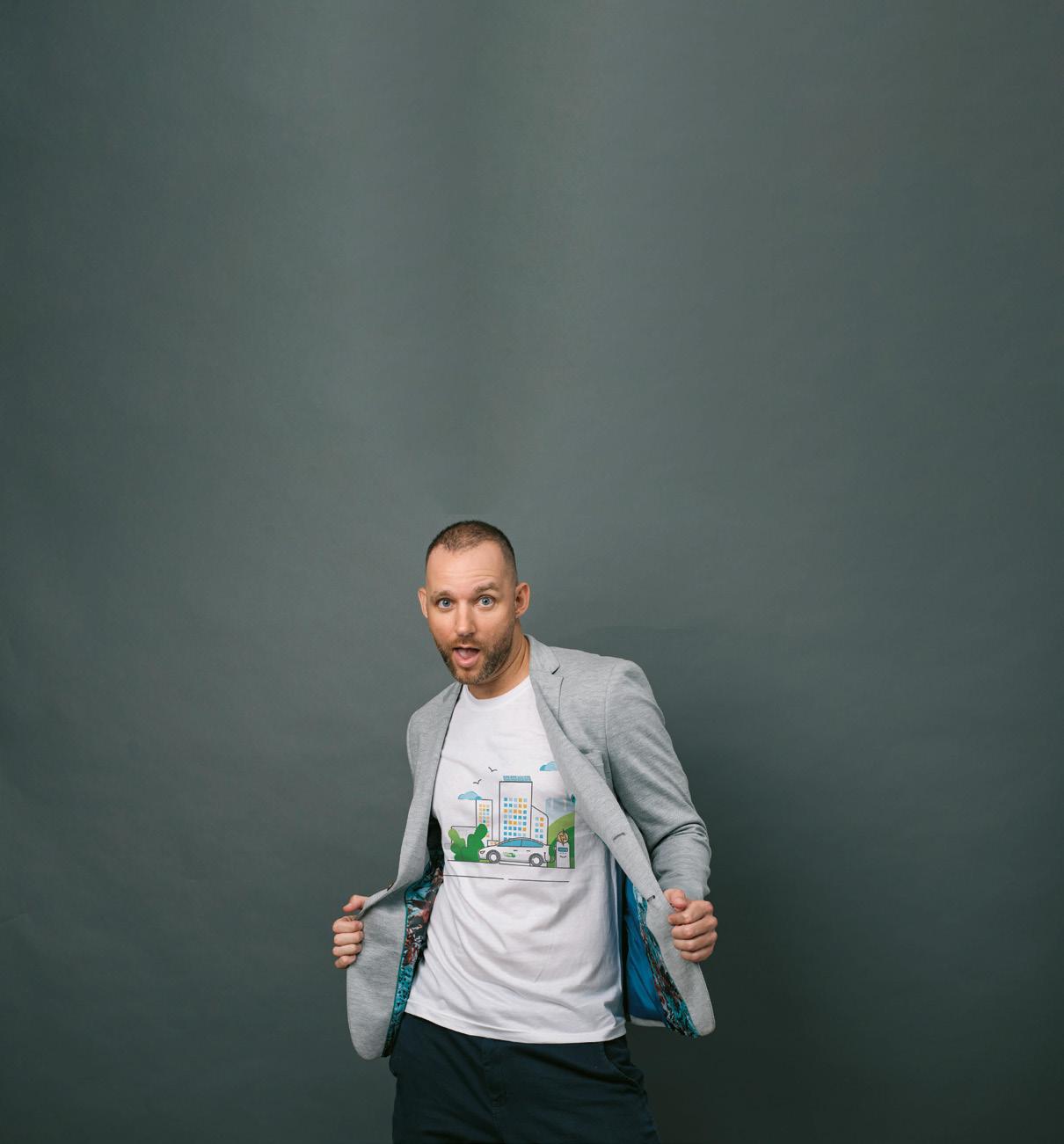

BUSINESS ENERGY FINANCE NO INTEREST FOR THE FIRST 3 YEARS All loans are subject to normal bank lending criteria, credit approval by the Bank and a credit agreement. Further terms and conditions are available from www.bov.com. Issued by Bank of Valletta p.l.c., 58, Triq San Żakkarija, Il-Belt Valletta VLT 1130. Bank of Valletta p.l.c. is a public limited company regulated by the MFSA and is licensed to carry out the business of banking in terms of the Banking Act (Cap. 371 of the Laws of Malta). EERE Malta is co-financed by the Republic of Malta, the European Union under the European Regional Development Fund. SWITCH NOW, GO ECOO Get in touch | bov.com/businessenergy | @bovofficial
A man with a plan
Kenneth Farrugia was appointed chief executive officer of Bank of Valletta in mid-October 2022. He spoke with Vanessa Macdonald about focusing on the channels through which services are delivered to customers.
The crypto-currency rollercoaster
At the time of writing, the global cryptocurrency market cap stands at $835 billion, down from a high of $3 trillion in November 2021. Lea Hogg asks Ken Goodwin, a TEDxTALKS speaker, U.S. White House Business Council/Forward member, and an adjunct professor on the Economics of Digital Assets if it is time to get on board or head for the exit.
Malta’s 2023 economic outlook
In the history of humanity, 2022 was another average year. From our own experiences, however, it felt like quite an extraordinary year, especially at the tail end of the pandemic. So many are, inevitably, eagerly looking to turn the page and start a new year with renewed optimism and hope for better days. Chris Meilak continues.
How asking what if...? can lead to break-throughs
Companies had little appetite for funding research during the uncertainty of COVID-19, but the university’s Research, Innovation, and Development Trust sees renewed interest. CEO Wilfred Kenely discussed some of the projects currently underway with Vanessa Macdonald
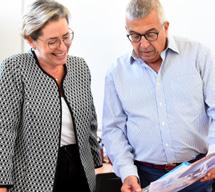
Malta’s fintech boom and its emergencies

The official website of Finance Malta, the country’s primary marketing arm for luring foreign direct investment to Malta, fintech businesses have been lured to the island because of the abundance of expertise in technology and finance. Venture capital and portfolio management professional Adrian Galea elaborates.
need for a national payments (r)evolution
Payment systems are often taken for granted and underestimated. Credit cards, debit cards, online payments, mobile phone payments, contactless payments, and other new payment methods have become popular in the past few decades. Payment services underpin main streets, the wheels of industry, markets, and government operations. No other banking activity is as essential to either society or business as payments. JP Fabri continues.
The next financial frontier
Banks have long recognised that if they can grab their clients’ attention while they are young, they will most likely keep them for life. As a result, they have always been fast to capitalise on new and developing trends, and today’s hot tech potato, the metaverse, is no different. MONEY examines.
Joshua Ellul, associate professor and director of the University of Malta’s DLT centre, discusses the FTX story and the ripple effects it created.
Malta has become one of the best places in the world for foreign investors to do business. As a result, Malta has been among the top five European countries with the highest real GDP growth for the past decade. ABut as time passes, the things most important to our economic success are losing steam, so Malta’s attractiveness as a jurisdiction might soon be called into question. Jordan Portelli explains.
ISSUE 75 MONEY 06 CONTENTS
The
FTX was everything that crypto is not
Wake up! Malta’s attractiveness is at risk.
08 22 36 26 40 18 32 16 12
Are 60/40 portfolios still relevant?
The traditional 60/40 portfolio, in which 60% is invested in stocks and the remaining 40% is invested in bonds, has been the go-to strategy for many investors over the past decades. Paul Rostkowski and Daniel Galea explain.
10 lessons about running a business that I learned from running a marathon
COVID-19 was an extremely tough time for Richard Muscat Azzopardi. However, with time on his hands, he decided to run a marathon. Here is what he learned.
A beautiful year
MONEY spells out your new year’s resolutions in luxury and style.
42 44 54 56

There’s no business like snow business
MONEY’s pick will help you milk a powder day.
Adrian Galea is a venture capital and portfolio management professional for earlystage start-up investors. He also manages a Facebook group called Malta Startup Space that inspires start-up culture in Malta. For more information, www.clutchplayadvisors.com. FINTECH / 22





Chris Meilak is an economist and leads EY Malta’s economic advisory and sustainability services. ECONOMY / 32

JP is a founding partner at Seed, a multi-disciplinary advisory practice. FINANCE / 36
Jordan is an economist and CIO / portfolio manager for a local financial services company. ATTRACTIVENESS / 40
Joshua is an associate professor and director of the centre for DLT at the University of Malta, which runs a multidisciplinary Master’s programme in blockchain and DLT. MARKETS / 26
Lea produces and hosts a popular current affairs TV show. She provides multimedia content, analysis, forecasting and assessment reporting for a number of international corporates. CRYPTO / 18

Richard is the CEO of Switch — Digital & Brand, a marketing agency that forms part of ICOM, the world’s largest network of independent agencies. GOALS / 44
Vanessa had every intention of retiring but so far has been caught up by exciting freelance projects and voluntary work. BANKING / 08 INNOVATION / 12

MONEY THE FINANCE EDITION 07 CONTENTS
A MAN WITH A PLAN
Kenneth Farrugia was appointed chief executive officer of Bank of Valletta in mid-October 2022. He spoke with Vanessa Macdonald about focusing on the channels through which services are delivered to customers.
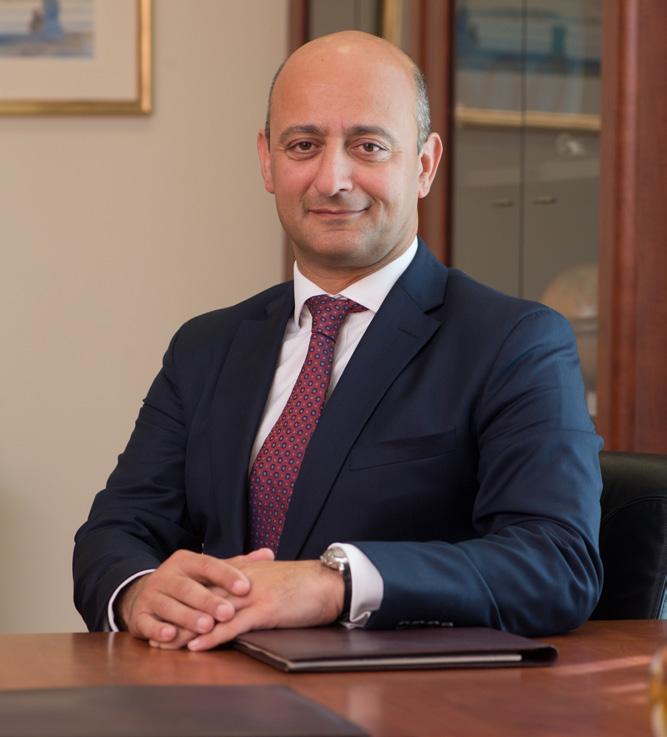
Over a decade ago, Bank of Valletta organised an internal workshop to discuss the future of the retail banking network. It was thoughtprovoking stuff, especially when Malta was still struggling with the large amount of cash in circulation, the high number of cheque payments, challenges concerning electronic payments in retail outlets, and the reluctance to use cards to get credit. The list was endless.
At that time, the bank was already almost 40 years old, having overcome the teething pains of puberty, and growing into a role that was already quite significant in terms of its impact on the economy.
The arrival of HSBC Malta just over a decade before had shaken it out of the complacency that comes from a status quo, and BOV had – albeit
ISSUE 75 MONEY 08
BANKING
with some grumbling – risen to the challenge. First, it introduced telebanking, which was radical at the time, and then internet banking before moving into mobile banking. And Farrugia, who joined the bank in 1985, is determined that there is still more to be done.
“Now we are taking it to the next level,” he said, stressing that digital will remain part of the bank’s strategy for the future.
The bank will be celebrating its 50th anniversary in 2024. It is getting close to the end of the last year of its current 3-year strategy, and it still plans to keep a “bold balance” in the ways it serves customers. Indeed, as had been discussed in detail at that workshop, the retail network evolved, and it was never part of the bank’s ethos to close significant numbers of branches.
That does not mean things have stayed the same. For example, BOV had just under 80 cashiers across its branch network a few years ago. It now employs 40 people.
This has meant career opportunities for these staff, who were reskilled and upskilled to do more complicated, productive, and responsible work. This may have been BOV’s plan all along, but there is no doubt that the restrictions imposed by the COVID-19 measures made people overcome their resistance to change when it came to other ways of banking. As a result, foot traffic in branches has fallen, more people have switched to direct debits, and more transactions have been shifted online.
“Three years ago, we processed 350,000 cheques in January. Last month, we processed 120,000, which means that the footfall in branches, when it comes to cashing cheques, is shifting,” Farrugia said.
“People have started getting used to paying digitally through our mobile banking app. But there is more: the ability to apply for a loan online or to block a card and refresh your PIN. Do you want to open your card for international transactions or just local ones?” he explained. The bank wants to empower its 365,000 customers by giving them various options to choose between—what Farrugia referred to as the “omnichannel environment”. This means retaining a “reasonable presence” in the community for those who prefer to go to the bank in person but building up functionality for those who prefer to do things online, with hybrid solutions for those who want a digital channel but still want assistance.
He also wants to ensure that its customers are comfortable with the extent and pace of change. So it is actively measuring transaction and promoter scores through customer satisfaction surveys. It also recently held a “customer experience week” to understand customer expectations and extend opening hours.
“The feedback was very positive,” he confirmed. Technology and behavioural changes have also affected the layout of branches. For example, fewer cashiers mean more space dedicated to areas providing privacy for customers who want to discuss complex or confidential issues.
The use of technology does not only refer to customer interactions. On the operational front, many processes can be robotised, with chairman
Gordon Cordina saying in the last annual report that the bank would “continue with our digital transformation, which will help this year focus on the revision of customer and internal processes.”
The report listed “enhanced investment processes, a new credit underwriting tool, and soon-to-be-delivered digital-based home lending and customer onboarding processes,” which are given considerable importance by Farrugia. The bank has created what it calls “digital factories”, assisted by experts, to challenge outdated processes. It is also working to improve its data quality, which will help the customer in the long run by giving faster responses or allowing digital transactions.
All this will free up resources and allow the bank to focus on the growing need for skills in risk and compliance, not to mention ESG (environmental, social, and governance) factors and sustainable finance.
BOV is taking quite a proactive stance. For example, the bank adopted the United Nations Environmental Programme Finance Initiative’s Impact Analysis Tool in 2021 to qualitatively assess whether its credit portfolio is aligned with the Paris Climate Agreement and the United Nations Sustainable Development Goals. It was also one of the 13 founding members of the Malta ESG Alliance, which was set up last July.
ESG will be a common thread across all the initiatives across the bank.
In addition, it has developed a “taxonomy”—or classification—of climate and environmental-related risks and even finalised its own internal Climate Stress Testing model.
“Banks are being pushed to provide sustainable investment opportunities. A lot needs to be done in this space, in some sectors more than others. The big operators already realise the role that ESG has to play today. Sustainability has become a matter of competitive advantage,” he said.
The company incorporated elements of sustainability into the existing BOV Sales Policy and will steer its investment recommendations towards socially and environmentally responsible decisions. For example, its investment advice or portfolio management will consider the ESG rating, aiming for companies or funds that invest in companies with “satisfactory relative ESG performance and a moderate degree of transparency in reporting material ESG data publicly”.
“ESG will be a common thread across all the initiatives across the bank,” Farrugia vowed.
MONEY THE FINANCE EDITION 09
BANKING
POWERED BY
a springboard for local tech companies
Techmag assists Tech.mt in taking the local tech industry to new heights by capitalising on its strengths and helping tech companies succeed by promoting their products and services in Malta and worldwide.
NEXT EDITION
MARCH 2023
Interested in advertising?
hello@bemags.com
In association with
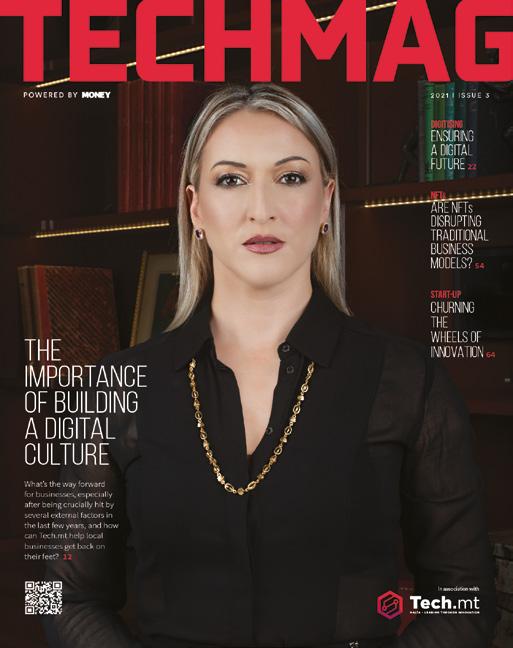
READ ONLINE
HOW ASKING WHAT IF…? CAN LEAD TO BREAKTHROUGHS
Companies had little appetite for funding research during the uncertainty of COVID-19, but the university’s Research, Innovation, and Development Trust sees renewed interest. CEO Wilfred Kenely discussed some of the projects currently underway with Vanessa Macdonald.

ISSUE 75 MONEY 12
INNOVATION
Wilfred Kenely is not the type to throw around hyperbole. So when he starts to talk about one of RIDT’s latest projects with more than a bit of enthusiasm, you know this is serious.
Let’s put this in context: RIDT has already been involved with sending an experiment into space (more on that later), so this new project is worth attention for generating such a reaction.
The project went through all the agonies you would expect, with applications turned down until the RIDT got the team in the Electromagnetics Research Group in touch with Evolve. This company provided three donation tranches of €25,000 – with no strings attached. Its only condition: is that the money goes to this particular research team. It started with a “what if…?” RIDT had already helped Prof. Charles Sammut and Gordon Caruana Dingli to investigate the use of microwaves to treat breast cancer (one of several cancer-related projects). What if microwaves could be used for other things?
Years later, the result is a pinprick blood test using a hand-held device that uses microwave technology to analyse three different metrics. The €2 test would replace some 850,000 tests done at Mater Dei every year at €30 each, and the pinprick would not only replace the need for blood to be drawn but would also give the first results in minutes.
For hundreds of years, the University of Malta focussed on teaching. Still, in the past few decades, it started looking at research, partly to play a part in the development of the community and also to “provide solutions to today’s challenges so that tomorrow will be a little better”, he explained.
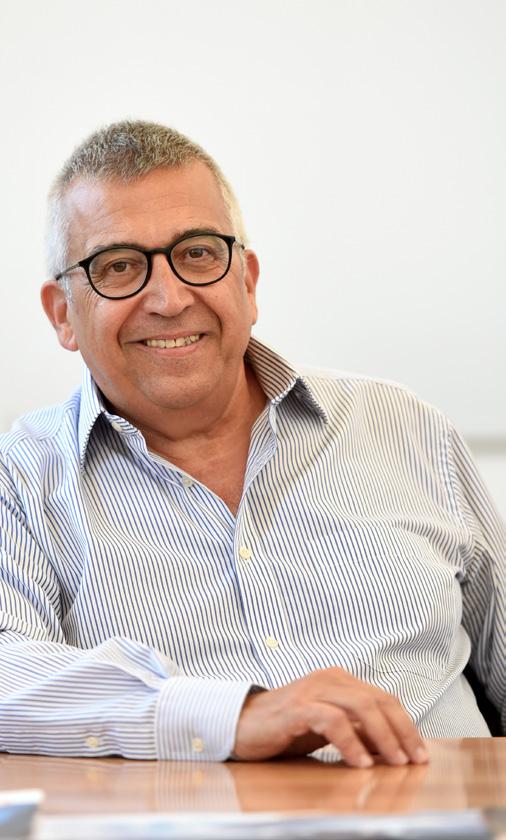
The trust was set up in 2011 and has financed over 60 projects. It has a dual role: filter through the various funding applications and source companies or individuals willing to donate money.
Research is carried out in various areas, from medicine and engineering to economics and information technology, from social studies to archaeology, the arts, and education.
“The medical and technological ones are perhaps more visible and more tangible. But there is also a lot being done in renewable »
MONEY THE FINANCE EDITION 13 INNOVATION
energy and sustainability and artificial intelligence,” he said.
The trust is involved in the crucial early stages of research projects: It supports the seed funds that projects require at the initial stages, without which they could not get anything moving. “You start with a proof of concept: it might work, but you must try it out. You need money to do that, which is where RIDT can help. Once you prove that the concept is feasible, you will need more money to work on the prototype, but unless you clear the first hurdle, you cannot move on to the second,” he said.
For example, the blood test project needed the original grant from Evolve. Still, the team later applied for €300,000 in Malta Council for Science and Technology funds, enough for
The proof of concept was a success, they developed a prototype through MCST funding, and FLASC is now being commercialised by a company that has spun off from the university.
Another project driven by curiosity was led by Prof. Joe Borg, whose team wondered what would happen if diabetic cells were exposed to microgravity and the harsh space environment.
“It was quite a long shot as taking cells to the International Space Station was costly and involved several entities, but Prof. Borg managed to do it, not once but twice, since the first attempt provided enough evidence to justify the continuation of the experiment and to try new things,” Kenely said.
RIDT found several local and one foreign
University research is driven by curiosity.
them to develop a prototype—an essential step towards commercialisation.
The university helps along the way, starting with due diligence on the provenance of the donated funds, which its Legal Office carries out. To enable researchers to focus on their work, the support unit assigns an officer to each project to look after administrative issues such as budgets, procurement, and reporting. And if the project is commercially viable, the Knowledge Transfer Office of the University will help them file for a patent.
Kenely ran through some examples of successful projects, stressing that even research that was not successful was necessary as results are published and shared with the global scientific community, directing efforts in new directions and away from deadends.
Thankfully, RIDT has seen some tremendous breakthroughs. Seven years ago, it provided €8,000 to a team considering ways to use compressed air to store renewable energy.
company, as well as government support, for the space project. As a result, the scientific community is now waiting for the results to be published with bated breath.
He stressed that the research outcome is not always positive; however, that does not mean it has no use. “It is difficult to be cool about negative results as they are usually not as exciting. But when it comes to research, a negative result says that an approach has been tried but did not work. That is why results are published so the broader global scientific community knows that a particular approach is not worth pursuing and they can try something else.”
What motivates companies to donate to research, especially if they have their own R&D units?
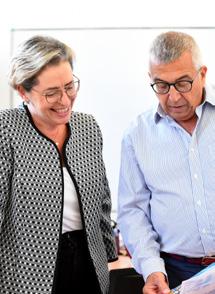
“Industry research is usually triggered by the need to solve a problem, for example, to improve a product or to develop a new one. On the other hand, University research is driven by curiosity.
“More and more companies realise that they have a role to play in corporate social responsibility and do not necessarily donate because they will benefit directly. Companies or entities can opt to be associated with a particular project, or they can leave it up to us,” he explained. For example, the Alive Foundation has raised over €500,000 over nine years for cancer research, which went to various projects and researchers, including the microwave technology that led to the blood test mentioned earlier.
“Some companies fund projects that have nothing to do with their line of work as pure philanthropy,” he added.
“And more companies realise that supporting research pays because it provides a better quality of life for the future. For example, RIDT persuaded many companies to donate serious amounts of money to preserve a mural at the Grandmasters Palace. They will get nothing back. They appreciate that investing in conservation will safeguard our heritage.”
ISSUE 75 MONEY 14 INNOVATION

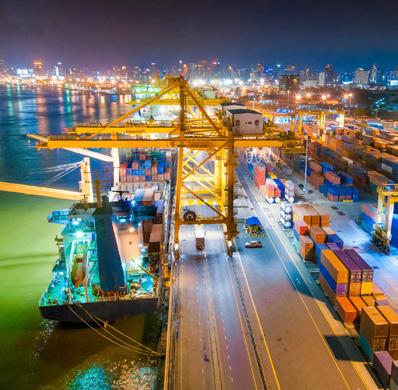
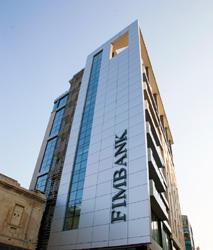

The value of a dependable banking partner goes beyond the delivery of financial solutions. We strive to provide a high-quality banking experience to our customers, by building relationships and offering products and services designed to enable their business to achieve sustainable growth. Trade Finance - Corporate Banking - Real Estate Finance Factoring - Forfaiting - Treasury Services
FIMBank plc is regulated by the Malta Financial Services Authority and is listed on the Malta Stock Exchange. The Bank’s registered address is Mercury Tower, The Exchange Financial and Business Centre, Elia Zammit Street, St Julian’s STJ 3155, Malta. The Bank is licensed to undertake the business of banking in terms of the Banking Act 1994 (Cap. 371). Terms and conditions apply and are available on request. +356 2132 2100 info@fimbank.com www.fimbank.com
Your trade nance and corporate banking partner
FINANCIAL
Banks have long recognised that if they can grab their clients’ attention while they are young, they will most likely keep them for life. As a result, they have always been fast to capitalise on new and developing trends, and today’s hot tech potato, the metaverse, is no different. MONEY examines.


However, the metaverse—permanent, immersive digital worlds that may offer everything we need to live our lives digitally under one roof—opens new avenues for businesses to engage with customers. Banks, as usual, have been eager to capitalise.
Let’s examine how banks and other financial service providers are making their mark:
ISSUE 75 MONEY 16 METAVERSE
Customers from Generation Z are born and raised with technology, so shopping online for goods and services is their default option.
Virtual reception areas
In retail banks, one of the most apparent uses of the metaverse is to build “virtual branches” where they may offer banking products to a new breed of digitally native Gen Z consumers or give customer support to existing clients.
Every month, hundreds of thousands of people visit new metaverse sites such as The Sandbox and Decentraland. On the other hand, established gaming platforms with metaverse-like capabilities, such as Roblox
or Fortnite, may draw millions of users. Their customers are digital natives who want to do business with firms that understand and enjoy virtual worlds and gaming-style environments.
HSBC was among the first to establish virtual stores, having bought property in The Sandbox early this year and intending to use it to connect with online sports fans and e-sports lovers. Suresh Balaji, the company’s chief marketing officer for the Asia-Pacific region, said, “At HSBC, we see a lot of potential in developing new experiences through new platforms. This will give our current and future clients and the communities we serve a whole new world of opportunities.” Siam Commercial Bank of Thailand also operates a virtual branch on the Sandbox platform.
JP Morgan Chase is another global financial giant that has already established a presence on the Decentraland platform. For example, it set up the Onyx lounge in the Metajuku virtual mall, where people can learn about blockchain and other tech-based projects the bank is working on. It also has a tiger and a photograph of Jamie Dimon, the company’s CEO.
This tendency, however, is more recent than it appears. Second Life, which has been running since 2003 and is made by Linden Labs, is often thought of as one of the first metaverse settings. A few years later, in 2007, the Danish investment bank Saxo opened an office on the platform. It included many features that today’s metaverse bankers are working on, like the ability to use avatars to interact and talk to each other.
Bridging the divide between virtual and real economies
With metaverse spending anticipated to reach $5 trillion by 2030, it’s a huge business. Banks are already planning for their profits by transferring money and maybe other assets between the digital and physical worlds.
Metaverse platforms enable users to purchase virtual items like Nike footwear and Gucci clothing to personalise their avatars and virtual residences. Money may also be gained by playing online play-to-earn games like Axie Infinity and the Meta Cricket League. This mainly entails dealing in cryptocurrencies and other unique digital assets, such as NFTs.
This money is transferred into the real world by trading it for actual currencies, which are paid into a bank account.
Start-up Zelf, called the “bank of the metaverse,” lets users move money between virtual worlds and the real world and safely sell valuable in-game items to each other.
It’s all about appearances
Banks and financial services firms are interested in establishing a reputation as techsavvy, cutting-edge, high-tech corporations. With new technologies like artificial intelligence (AI), automation, virtual reality (VR), and the internet of things (IoT) changing so many parts of our lives, banks need to make sure they are seen as cutting-edge. One reason is to keep attracting top talent, which would otherwise go to tech giants like Google, Facebook, or Apple in search of the most exciting and profitable jobs.
There has been a lot written and said about businesses’ lack of skills when trying to use the most powerful and potentially gamechanging technology. Making sure they have a strong presence in the metaverse, banks, and financial institutions helps to ensure that they are seen as top destinations for the best and brightest graduates and job seekers—the people who hold the keys to breakthrough innovations.
What is the future of banking?
So, is metaverse banking another fad that will fade when customers lose interest? With real bank branches disappearing at an unprecedented rate, financial organisations may look to the metaverse and virtual worlds to preserve client connections and offer basic banking services.
It’s also clear that virtual economies and the exchange of virtual goods and services are on the rise. For example, when today’s younger generation of customers matures, they want to bank and seek financial advice where they feel at ease. Virtual environments will offer them a familiar platform to do so.
It is still unknown precisely what the metaverse is, let alone what it will look like in five or ten years. However, the banking and financial industries believe it will be an essential part of our lives and want to be a part of it.

MONEY THE FINANCE EDITION 17 METAVERSE

At the time of writing, the global cryptocurrency market cap stands at $835 billion, down from a high of $3 trillion in November 2021. Lea Hogg asks Ken Goodwin, a TEDxTALKS speaker, U.S. White House Business Council/Forward member, and an adjunct professor on the Economics of
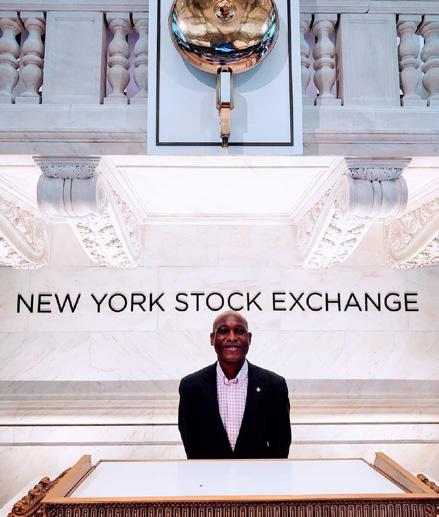
Ken attributes part of the decline in value to moving money out of crypto to gold and cash as investors weigh in on the global macroeconomic impact of high inflation. “Bitcoin has traditionally experienced a 4-year cycle - it has a downward pressure in pricing despite fewer bitcoins being minted. This usually occurs from December until the 1st week of January. Additionally, Ethereum had a merge, resulting in more centralisation, causing a greater pullback,” Ken explains.
Bitcoin started taking losses in Q4 2021 and continued to weaken, rocked by the economy’s headwinds, rising inflation and interest rates, lack of investor confidence and the war in Ukraine. Will the recent collapse of industry giant FTX make its fall even steeper and have a knock-on effect on other crypto exchanges? »
MONEY THE FINANCE EDITION 19 CRYPTO
Digital Assets if it is time to get on board or head for the exit.
Simply put, the price of a bitcoin depends on the general sentiment at a point in time.
FTX, the world’s second-largest exchange, filed for bankruptcy after its finances were revealed to be unstable, and founder Sam Bankman-Fried is now in custody. US regulators accuse him of building “a house of cards on a foundation of deception while telling investors that it was one of the safest buildings in crypto”.
Preceding the FTX scandal was the collapse in May 2022 of two digital coins that caused $400bn to be wiped from the value of the crypto ecosystem. Hacking has also exploited crypto company vulnerabilities, with the Ronin Network losing $600m alone. Scammers are believed to be responsible for over $10m in losses daily, and Spanish bank Santander reports its customers lose $1.2m monthly in crypto fraud.
Regulation and lack of it have also influenced cryptocurrency volatility. For example, in 2021, China made all cryptocurrency transactions illegal, stating that cryptocurrency “seriously endangers the safety of people’s assets”. The same year the FCA banned the sale of complex derivatives that speculate on cryptocurrency movements, and in July 2022, President Putin banned paying for domestic goods and services with cryptocurrency.
Regulators are concerned. What started in 2009 as a forum for a few anti-establishment believers quickly grew with promoters helping Bitcoin become recognised and sought after. In May 2021, three state-backed organisations announced there would be no consumer protection if they lost any money from crypto trading. The following month, banks and payment platforms were told to stop facilitating transactions while bans were issued on crypto “mining.”
Ken argues that crypto will survive, suggesting that “major traditional exchanges will migrate to being custodians and the exchanges that are registered such as Coinbase and Paxos have distinguished advantages. So I would not be surprised to see NYSE, NASDAQ and other major exchanges start to trade registered Cryptos.”
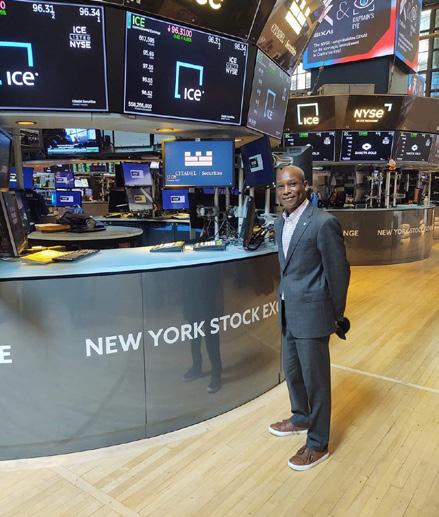
Bitcoin still holds the top position with a market cap of $321bn at the end of 2022. Despite the fall in value, bitcoin’s previous performance might give some investors confidence in a full recovery. For example,
in 2013, one bitcoin was worth $112. At its peak in November 2021, its value had risen to $69,000. But by May 2022, it was worth less than half of that and now hovers around the $17,000 mark. So, if you bought early, you are likely still ahead. However, if you bought near the 2021 high, your losses could be as much as 70%. That said, Ruffer, the UK investment management firm, added bitcoin to its portfolios and sold five months later with a $1.1bn profit.
When examining the way institutions select crypto, Ken notes that “institutions are choosing crypto with utility use cases while allowing others to fail. They are using stablecoin investments more as these are better use cases to participate in the blockchain network. In addition, large financial institutions are exploring tokenisation across asset classes as an option and a way to provide more liquidity to assigned underline assets (i.e. Blackrock, Fidelity, State Street).”
ISSUE 75 MONEY 20 CRYPTO
Crypto is valued by supply/ demand economics and influenced by social events, thus making it a volatile asset class.
Celebrity promotion of cryptocurrencies and reports of people making millions attracted individual investors. According to the UK Government, one in ten British adults own a crypto asset, and the Pew Research Center reports that 16% of Americans have invested in, traded, or used cryptocurrency.
Fundamentally, bitcoin and other cryptocurrencies are digital assets used like regular currency. But there, the similarity ends. The coins do not exist physically but use blockchain technology to send data in cyberspace using the peer-to-peer payment to cut out bank fees. Surprisingly, many individual investors need help understanding what they are investing in but are afraid of missing out.
Bitcoins have a finite issue limit of 21 million coins that can be mined. Therefore, their value is based on speculation, making them volatile. Simply put, the price of a bitcoin depends on the general sentiment at a point in time. Commenting on the price of cryptocurrencies, the investment manager at Sparrows Capital, Mark Northway, said, “any intrinsic value does not underpin it. It is determined by one thing: confidence”.
Analysts advise that it’s best to consider cryptocurrency as a long-term investment rather than a short-term bet. Extreme volatility and substantial risk make cryptocurrency investment not for the fainthearted. Those who take the plunge should do so wisely, never investing more than they can afford to lose.
Speculation determines coin value, whereas a company’s share price moves in line with actual or anticipated performance. But are there safer ways to invest in cryptocurrency, Hargreaves Lansdown, one of the UK’s largest share trading platforms, believes so. You can buy shares in bitcoin-related companies, invest in cryptocurrency exchanges, buy shares in companies accepting Bitcoin, or invest in a bitcoin exchange-traded fund ETF which allows you to buy into the fund without buying bitcoin. Some investment companies are also launching bitcoin funds, making it easier to sell off an investment. Other funds offer some exposure to Bitcoin as well as shares and bonds.
Irrespective of bankruptcy lawyers describing the FTX failure as “one of the most abrupt and difficult collapses in the history of
corporate America”, companies like Visa, PayPal and Mastercard are adopting Bitcoin. In addition, there is speculation that Amazon is considering accepting bitcoin as payment, and rumours continue to circulate that Apple may invest in the coin.
Dubbed as ‘britcoin,’ the Bank of England is looking at its own central bank-backed digital currency, and the Federal Reserve is on the same track. In addition, in 2020, the world’s largest asset manager, BlackRock, offered two funds to invest in bitcoin futures; the same year, S&P Dow Jones announced it would add 550 of the top traded cryptocurrencies to its indices.
The involvement of large institutional investors will likely help calm the crypto asset market. While some banks remain cautious, most major UK banks now let you move money between a regulated crypto exchange and your bank account.
Prof Omid Malekan of Columbia Business School says crypto remains primarily a technology, and in that regard, he says, “It is doing just fine, in some ways better than ever.” For example, the technology improves lives in developing countries with no reliable financial infrastructure. It is also being used by charities to get funds into territories where traditional banking is made impossible due to conflict or repression. He also argues that the latest scandals are “a chance to purge the scammers and grifters” out of crypto.
In Ken’s view, “one must distinguish between crypto and blockchain technology. Blockchain technology has improved somewhat due to better use cases and DeFi applications. Both traditional and non-traditional blockchainbased firms are finding ways to apply the technology and create better solutions. In regards to crypto being the legal tender in certain countries, it remains to be seen whether this would substantially impact both central bank and household balance sheets and help central banks need to manage their foreign reserves with other nations. On the other hand, stablecoins are a separate issue and could sustain a long-term positive impact on society”.
Carol Alexander, professor of finance and leader of the Quantitative FinTech (QFIN) research group, believes “Crypto is just a
concise word for the future of the digital global economy” and cites the use of crypto technology in building metaverse environments which some think will be the future of work and life.
Ken concurs, describing crypto as “just a tool for the world to move towards a digitally transformed society whereby a global digital ID policy will be used to implement a global CBDC to track, monitor and record the actions of global citizens”.
So can cryptocurrency be a wise long-term investment? According to banks, hedge and pension funds, the answer is positive, with more of them investing in cryptocurrency than ever before. However, a BBC article published in December 2022 argued that crypto relies on having a strong and diverse pool of exchanges to survive. Without a credible and trusted place to exchange safely, the BBC report that crypto is unlikely to return to the highs of Nov 2021. Proceed with caution is Ken’s sage advice, “Crypto is a volatile asset class without any insurance or collateral, and as such, one could lose everything. Individuals should always do due diligence and research when investing in crypto. Crypto is valued by supply/demand economics and influenced by social events, thus making it a volatile asset class. Stablecoins are backed by currencies and commodities and offer some stability in pricing. Tokenising tangible assets will create a better price discovery for tokenised assets that could be more efficient.”
Is crypto a safe investment for the long term?
Ken says, “I would not invest in Bitcoin as part of a child’s education investment account. I would create a separate investment account for other purposes”.
About
Ken Goodwin is the Managing Partner of Jeanensis Ventures, a digital venture capital advisory firm targeting seed to Series A digital transformation firms within Blockchain Applications, FinTech, AgriTech, RegTech, EduTech, AI and Web 3.0. He is also the Blockchain/Digital Assets Contributor to FinTech TV on the floor of NYSE. Aspen Institute Nakasone and Mike and Maureen Mansfield Fellow, PhD Project Member, Ronald E. McNair Scholar and Harvard Model Congress Member.
MONEY THE FINANCE EDITION 21 CRYPTO
MALTA’S FINTECH BOOM and its emergencies
The official website of Finance Malta, the country’s primary marketing arm for luring foreign direct investment to Malta, fintech businesses have been lured to the island because of the abundance of expertise in technology and finance. Venture capital and portfolio management professional Adrian Galea elaborates.

ISSUE 75 MONEY 22 FINTECH
The local labour pool is deep enough to meet the needs of ICT employers across the range of technical and creative skills. At the same time, specialist knowledge can easily be sourced from overseas due to an incentive programme for foreign workers. Companies are also using Malta as a springboard to nearby markets, particularly those in Africa, which is increasingly becoming a testing ground for new financial technologies. Some of the key strengths of the cluster are the banking and payment providers, AML/ KYC compliance platforms, risk and asset management platforms, insurtech platforms, digital identity management platforms, and more.
Malta seeks to be a pioneer in regulating emerging technologies, with an interest in capturing a regulatory first-mover advantage and creating a cluster of economic activity. The model is employed with great success in the iGaming industry, with further successes in the captive insurance and securitisation markets, to name a few. Was the “Blockchain Island” strategy a success? It appears that the best response depends on who you ask. While some believe, the strategy failed to flatter, Malta does include prominent players in the fintech community, such as FalconX. Additionally, Malta has seen the emergence and growth of a couple of fintech start-up stories, Finaro, a Malta-based payment company, was acquired for over €500 million by a leading US firm, and embedded finance start-up Weavr, born here in Malta, recently raised $40 million to expand its global operations.
Through the enactment of the Virtual Financial Assets Act, regulatory innovation has expanded to distributed ledger technologies and cryptocurrencies. Whether Malta’s legislatures can keep up with the ebb and flow of the market and keep in tune with new ideas and technologies as they emerge is yet to be seen. To do this, the regulators of all financial services in Malta, the Malta Digital Innovation Authority and the Malta Financial Services Authority, have been given a clear fintech strategy. The authority is committed to creating the right conditions for fintech start-ups and scale-ups, tech firms, and traditional
financial services firms to create fintech products that have the power and potential to define the next generation of finance. The MFSA has set up a Fintech Regulatory Sandbox, which gives companies providing financial services with a safe place to try out new products and services. The main goal of the regulation is to bring law and order to a market that has been primarily unregulated up until now. This will protect consumers and keep the market honest. AI and IoT technologies are next on the country’s agenda. Globally and locally, most fintech companies are already using AI, and according to Finance Malta, the technology is expected to dominate the market by 2025.

So how is the emergent class of Malta’s start-up ecosystem dealing with the current fintech landscape in Malta? And what strategies do they intend to implement to scale to internationally relevant markets?
Andaria is a fintech start-up that aims to make business banking more accessible and usable. Its CEO, Nirav Patel, shared with us his belief that its product offering will help shake up the traditional notion that business banking needs to be expensive and requires prior industry knowledge. “We want to create a mentality shift in how businesses look at their payments flow, as not simply a means of collecting funds, but as part of their whole offering.”
Nirav is an accomplished and high-achieving payment and banking executive who continues to challenge the status quo by diving into nascent industries and accelerating companies through technology and innovation to achieve growth and profitability. Nirav was named CEO of Andaria Financial Services Limited in November 2020. Since then, »
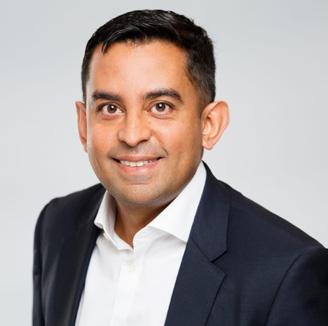
MONEY THE FINANCE EDITION 23 FINTECH
Nirav Patel
he has overseen the company’s strategic vision and goals to become a leader in embedded finance. Andaria wants its “embedded finance” service to support big and small businesses in improving their customers’ experiences with payment services that add value.
What major paradigm shifts in the market, technology, or regulatory pillars affecting the fintech industry have affected start-up opportunities?
Shifts are happening across the board, and it is tough to pinpoint which one affects the fintech industry the most. From geopolitical unrest in various parts of the world to rising living costs, from Open Banking adoption by the traditional banking community to developments in the crypto space from both a regulatory and economic standpoint (the recent FTX saga speaks volumes in this
regard), the fintech industry is now so synonymous with all of the above that opportunities abound. Moreover, the start-ups in this space can help alleviate parts of or even, at times, find solutions to problems that, at first glance, seem too tough to crack.

It is encouraging for us to see start-ups in the fintech space taking all shapes and forms and tackling a wide range of issues across the globe. Companies like Revolut and N26 in Europe provide full digital consumer banking. Klarna and Zilch have actively pursued consumer lending, while C2FO and Wayflyer have focused on business lending. Other companies, like Comply Advantage, a partner of Andaria, have focused on specific issues like fraud prevention. There are also companies like Andaria that are taking financial technology one step further by allowing it to be seamlessly integrated into the client’s ecosystem.
We tackle issues that B2B businesses have faced for a very long time:
» Disjointed customer experiences when it comes to payments.
» Heavy dependency on human resources regarding
reconciliation, treasury, and accounting.
» Overall cost reductions when moving funds both locally and cross-borders.
Start-up opportunities in the fintech space are plenty, with the regulatory environment improving to make such businesses more scalable and secure for their clients.
What are the primary strategic comparative advantages that your start-up is attempting to capitalise on? How does Malta enable such strategies to develop?
Malta is an excellent testing ground for fintech companies. A sound regulatory regime, strengthened by a regulator that is an enabler for such companies to develop, a plethora of businesses that are increasingly conscious of the customer experience their customers are getting, as well as a stable economy that helps predict the financial needs of clients, give Malta and start-ups within the ecosystem a definite advantage vis-à-vis other jurisdictions. While the fintech space on the island is still relatively new, which means access to trained resources can be limited at times,
ISSUE 75 MONEY 24 FINTECH
Every company, in the not-so-distant future, will become a fintech company.
the otherwise favourable economic conditions make a strong case for Malta to be considered a clear choice for fintech start-ups to thrive.

Have you used any regulatory tools that Malta offers, like the regulatory sandbox or the MDIA?
While we have not used such tools, we are in discussions with the MFSA to learn how we can benefit from and, more importantly, contribute to such tools, not only for Andaria’s growth but also for the overall growth of the Malta Fintech start-up community. Engaging with such tools and bringing together the fintech community on the island will only help more fintech start-ups flourish in the space.
What are the main headwinds and threats facing your business? What resources do you have at your disposal to solve them?
The challenges are always plentiful as a start-up, and ours are no different from any other start-up’s. We need to utilise our funds most appropriately, recruit in a very fast-paced and competitive environment, keep abreast of the constant technological developments, and at the same time, remain true to our mission. We believe our resources lie mainly with our people, in the belief that we share a common vision for
where we want to be, both from a technology perspective and in terms of what we want to deliver to our clients, as well as what our brand stands for now and in the years to come.
What is the vision for your start-up within the next five years?

Andaria will become a leader in the B2B embedded payments space. We want to be a household name for any company that wants to enter the industry but is unsure how or what it will gain from doing so. True to our mission, we want to take this global while expanding the local business.
When “fintech” emerged as a term, it was initially applied to the technology employed at the back-end systems of established financial institutions. In the early 2010s, “software was eating the world,” and the financial industry was no exception to the rule. Since then, however, there has been a shift toward more consumer-oriented services and, therefore, a more consumer-oriented definition, as illustrated by Andaria, a Malta-based start-up tackling the challenges of this emergent field in finance. Fintech includes sectors and industries such as education, retail banking, fundraising and nonprofits, and investment
management. To borrow a phrase from Nirav, “every company, in the not-so-distant future, will become a fintech company.” As technology becomes more seamless in our daily operations, the lines between finance and retail will blur.
Malta’s mission is to establish the right conditions for fintech start-ups. If it is successful, start-up companies like Andaria may grow up to employ a highly skilled workforce and develop the common and shared know-how with the local ecosystem that will empower our communities and help us answer the challenges that the economies and technologies of tomorrow have in store for us.
MONEY THE FINANCE EDITION 25 FINTECH
FTX WAS EVERYTHING THAT CRYPTO IS NOT
Joshua Ellul, associate professor and director of the University of Malta’s DLT centre, discusses the FTX story and the ripple effects it created.
ISSUE 75 MONEY 26 MARKETS
First off, let’s clarify what FTX is. FTX and similar centrally-run exchanges provide the following services:
1. They allow users to buy different cryptocurrencies in exchange for debit/ credit card or bank transactions.
2. They allow for the trading, buying, and selling of cryptocurrencies and different forms of investments, speculation, or betting on whether the market price of a cryptocurrency will go up or down.
3. They allow users to withdraw their funds, which could take place by withdrawing crypto directly to a user’s cryptocurrency wallet (which is in no way connected to the exchange) or fiat currency (e.g. USD or EUR) to their debit or credit card or their bank.
There used to be similar ways to buy gold, silver, and other commodities, as well as stocks, shares, and other assets.
When you buy cryptocurrency, stocks, gold, or any other asset at one of these exchanges, you trust that the exchange has already purchased or has control of the asset and has set it aside for you in their system. So, that you can claim your assets whenever you want, you can request that your investment be withdrawn or sent to you.
If such services ensure that users’ requests for withdrawals are processed, everything will seem fine. However, once such a service provider does not have in its custody enough funds to cover the assets they are managing or is unable to process withdrawals for other reasons, users may begin to worry that the service provider is insolvent, i.e., the service provider is claiming to have more funds or assets than they are managing for their users. For example, imagine that you and I are the only users of a particular exchange, and I have €50 worth of cryptocurrency in the exchange, and you have €100 worth. Yet, in reality, the exchange only owns €25 worth of cryptocurrency, meaning they would have spent our clients’ money elsewhere. Because of this problem, clients could lose their money due to carelessness, lousy management, fraud, etc.
For the problem described above, whether the above service provider is a cryptocurrency exchange, a gold or commodities exchange, or any other stock or investment exchange is
not the issue. The issue is that we trusted a company to buy and hold certain assets for us, and they have yet to do so. When it comes to traditional financial assets, there is usually a regulatory framework and a regulator to ensure that companies treat their clients’ money well and don’t lose or mismanage it. Yet, it is essential to note that as a client, user, or citizen, we trust that such regulatory frameworks and regulators do their jobs (to the best of their abilities), yet this is not a 100% guarantee that it will stop such bad actors. However, if a good regulatory framework was in place and a regulator was doing its job, this would reduce risk in such jurisdictions for such cases, but it is not a panacea.

Also, there are good and bad regulators, and without getting into the details of the FTX case, media reports say it was regulated in a particular jurisdiction or jurisdictions. Indeed, this raises many questions. For example, where were their operations regulated? Did the regulator do their job? In addition, the process involved several affiliated companies operating in different jurisdictions; was there a particular jurisdiction that made it easier for this to happen?
Now, crypto-naysayers blame cryptocurrencies for this, but as discussed above, this has nothing to do with cryptocurrencies but with bad centralised actors. Blaming cryptocurrencies would be like blaming money for the various Ponzi schemes and scams we’ve seen over the past decades in the traditional finance world (e.g., Madoff’s Ponzi scheme). Scams, fraud, and illegal activities have been around for a long time and will continue to do so. They are drawn to new areas that are growing and attracting investment. Also, because there needs to be more regulation, it’s easier for them to do business since (i) regulators may not be able to step in and (ii) consumers may need to be told about better operators and jurisdictions. In fact, this is why Malta and other jurisdictions put in place regulatory frameworks for precisely these types of service providers. When you think about it, this is not a huge step in innovation when it comes to regulation. We’ve been regulating securities, commodities, and other types of assets similarly for decades.
Cryptocurrencies provide a solution to the problem described above, i.e., the problem of »
MONEY THE FINANCE EDITION 27 MARKETS
having to trust centralised actors and allowing them to cheat. Cryptocurrencies can be thought of as digital “money” (we’ll leave out the exact definition of “money” for the sake of making our point). But the digital “money” system can’t be changed or manipulated in a way that goes against the rules written into it. Being built on blockchain, which is one type of Distributed Ledger Technology (DLT), they provide a transparent means of keeping track of who owns what in a manner that guarantees that the rules encoded into the system cannot be broken (not even by the cryptocurrency system creators themselves). Decentralised exchanges (DEXs) can then be built on DLT to support the same types of exchange services provided by FTX (and others) without requiring an exchange service provider. If there is no exchange service provider, they cannot run away with clients’ investments. A pillar of the cryptocurrency sector is decentralisation: the ability for digital systems (owned by no one) to automate and provide digital services in a tamper-proof manner. The public should learn from this mess that cryptocurrencies and blockchain (DLT) offer a way out of situations where certain companies, entities, or people can’t be trusted.
Yet, the sector is still nascent, the technology is still developing, and regulators are still trying to figure out how to protect society, the market, and consumers while wrapping their heads around new types of decentralised entities. So people should be careful when investing their money, even though technology can change society.
When it comes to speculating about the price of particular cryptocurrencies, there is the general cryptocurrency market trend and individual cryptocurrency fluctuations based on the specifics of the cryptocurrency or token. The crypto market trend tends to affect
the price of all cryptocurrencies. E.g., if the price of bitcoin increases or decreases, all others follow; if an exchange like FTX crashes, the perception is that something went wrong in the whole crypto market because the entire market is still seen as a single whole. Over time, individual actors (cryptos or tokens) will have less of an effect on how the whole market is seen, just like in other markets. E.g., if a particular stock fails, it may not necessarily bring all stocks down (unless the other stocks were somehow linked to it, of course). Again, regulation will also help in this regard. Many say that the crypto market is too volatile, and indeed, it is the most volatile. Yet like any market, the speculative price that the market is willing to pay for an asset can be swayed quickly and by significant amounts. A single tweet about a company, a new CEO, the firing of staff, or whatever can cause the instant value of the market to drop or increase. We’ve seen this over the past months in the tech sector. It is just the way markets work. Over time, with regulation, the crypto market will become less volatile, like other markets.
Now, in the aftermath of what began with FTX, we are seeing ripple effects that have rendered other exchanges insolvent. In the 2008 financial crisis, something similar happened to Lehman Brothers. Because of the extent of other entities’ exposure to it, they were brought down with it, which resulted in a ripple effect. However, this should not be interpreted as having anything to do with technology or cryptocurrencies in general—instead, it has to do with the “unregulated cryptocurrency market” as a whole.

The main takeaways:
1. This is similar to a centrally managed investment platform. The differences are in the levels of regulatory requirements that were applied.
2. This has nothing to do with decentralisation, blockchain, or, for that matter, cryptocurrencies. It would be like blaming the general concept of stocks when an investment platform becomes insolvent. Cryptocurrencies and decentralised technology provide a solution to such situations.
3. This is why regulation was implemented, highlighting the need to regulate such centrally controlled platforms.
4. Speculation is speculation, irrespective of the market (though regulation helps).
ISSUE 75 MONEY 28 MARKETS
So people should be careful when investing their money...


Your Technology Solutions Partner go.com.mt/business With GO Business, your team can make a success of every opportunity. Find out more about our solutions at
WE DO NOT PROVIDE JOBS, WE OFFER CAREERS!
Lyndsey Grima talks to Martin Spiteri, operations manager at M Recruitment, about equal opportunities and bringing the right talent on board.

Operating successfully for the past ten years, M Recruitment is responsible for two types of recruitment: direct and outsourcing. With the former, clients approach them as a recruiting company to look for suitable candidates for the job. With outsourcing, M Recruitment employs staff on a full-time basis, which they then outsource to clients, also on a full-time basis.


“Outsourcing is a big part of our business,” says Martin. “It’s
most common in the hospitality, catering, care, and retail industries. We ensure that our staff is limited to a few hundred, not more, so it is manageable, and we can assist and support clients the same way as if the employees were on our premises.”
Like other agencies, M Recruitment attracts several third-country nationals, mainly from Dubai, Abu Dhabi, and Qatar, to name a few. The difference with this agency is that it works hard
to find the right people for the right jobs.

Martin explains that all candidates go through an online interview process. “Once we see that the candidate in question fits in with what our various clients want, then we give a job offer. We use several criteria to select a candidate that is right for that job role. We also invite the client to do an online interview with the candidate. If the interview goes well, we inform the candidate
that they have been chosen. The individual then begins a process in which we apply for their work permit. Once this is approved, the person applies for a visa, usually hands in their resignation from the job that they are working at, and then begins travelling to Malta.”
The process does not stop there. The staff at M Recruitment also guides candidates on where to look for accommodation to make it more convenient for them
ISSUE 75 MONEY 30 PROMO
to settle in. They also send all chosen employees a relocation checklist to make their journey as smooth as possible. Once they arrive on the island, individuals are given a full orientation session at the agency’s office to finalise the remaining details.
“As opposed to many stories we’re hearing, M Recruitment does not charge anyone any money for finding a job through our agency,” claims Martin. “It is illegal to do so. Our service to candidates is free, both through direct recruitment and outsourcing. The clients pay our fees. The same goes for the subcontracted work—we do not charge any fees. In addition, any third-country nationals we bring to the island are not charged any money for this service. We charge a minimal processing fee to settle their work permit and visa.”
Martin explains how there have been countless sad stories of people coming from countries like Dubai who have been charged up to €5,000 by companies to get a job on the island.
“This is white slavery, and it is
completely unfair. These people are coming here for a better future and starting immediately on the wrong foot. We completely CONDEMN this sort of abuse. We bring over people based on the right attributes and personalities, irrespective of race, ethnicity, and gender.”
Martin also highlights the fact that this brings about another obstacle. If an individual can afford to pay €5,000 to come to Malta for work, you are simply bringing in people who can afford it and not basing the individual on talent. “We are faced with employees who do not possess the characteristics that the industry needs. The industry is flooded with inexperienced people simply because they can afford the fees. “M Recruitment hires people based on their talent, experience, knowledge, and capabilities.”
Being an ethical employer, M Recruitment does its best to find the right talent for the local market. “We hear a lot of complaints, from locals,
especially on social media, that we are seeing fewer and fewer locals and Europeans working, especially in the catering industry. People don’t realise, though, that Maltese and Europeans are losing interest in the industry for various reasons. Unfortunately, the wages being paid in the industry are not competitive when compared to other markets in Europe, but it is not the case that the industry wants cheap labour. The margins are minimal, and with the current salary structure on the island, restaurants and hotels cannot afford to go above that structure, meaning that they cannot attract good European talent.”
M Recruitment does its best to find the best talent to serve its clients. “Most of the people we get have experience in the fourand five-star hotel industry or upmarket restaurants and cafes. They have already been exposed to a Western culture, which makes it much easier for them to integrate and be happy here. Our main aim is to help people find a career in Malta, not just a job, so that they can be happy here.”
M Recruitment aims to prioritise its employees’ mental and physical health. “We care for all our staff equally, and we have made wellness our priority this year regarding our office staff. A weekly gym session is being organised in collaboration with
I&J Fitness Team Gym and Team Sport to allow the whole team to train together, making a healthier lifestyle accessible for everyone. In addition, for all our outsourced staff, we give them a birthday card and a voucher to dine at one of our clients’ establishments, thus supporting our clients further.”

M Recruitment ‘s role as an agency continues even after the contract expires. Martin explains that when the staff contracts are close to ending, the agency either speaks to the client to see if they are happy with the candidate and will ask for a salary increase for them, or they see if the client would like to take them on directly as their employees, which generally means a promotion and career growth for the employee.
“We are proud to say that when we walk into our clients’ establishments today, their supervisors, managers, sous chefs, and head chefs are people we brought in in junior positions. We help them build their careers here. These little things might not seem significant, but they can change people’s lives. We are not here to offer people a job for a year. On average, 70% of our staff each year works with our clients directly. We give them careers that give them pride, and we take pride in that. It’s one of our biggest achievements.”
MONEY THE FINANCE EDITION 31 PROMO
M Recruitment hires people based on their talent, experience, knowledge, and capabilities.
A weekly gym session with I&J Fitness Team Gym and Team Sport for team training.
MALTA’S 2023

ECONOMIC OUTLOOK
ISSUE 75 MONEY 32 ECONOMY
In the history of humanity, 2022 was another average year: conflict between neighbouring countries, obstacles to trade, natural occurrences worldwide causing fatalities and damage, and government intervention needed to manage economic conditions. From our own experiences, however, it felt like quite an extraordinary year (including a World Cup in December), especially at the tail end of the pandemic. So many are, inevitably, eagerly looking to turn the page and start a new year with renewed optimism and hope for better days. Chris Meilak continues.

MONEY THE FINANCE EDITION 33 ECONOMY
However, 2023 will also pose several economic challenges—here is a list of four.
The big divide
Inequality is increasing at all levels and in all directions—income inequality, the digital divide, health, culture, opportunities, and other aspects of life. This is because economic growth has come at the expense of economic development, and redistribution systems are not working well. According to the United Nations, “inequality in its various forms is an issue that will define our time.” While income inequality between countries has declined in the last 25 years (meaning average incomes in developing countries are increasing faster), income inequality within countries (and societies) has risen—this is the form of inequality people feel daily. The UN says that 71% of the world’s population lives in countries
processes and outcomes. Several factors, such as economic and financial crises, natural
understand its effects and gain their buy-in, assessing the organisation’s readiness for change and the human impact, educating leaders on how to manage and monitor the transition effectively, monitoring the progress of individuals as they go through the different stages of the transition; and helping individuals understand how they can positively contribute to the change and the importance of their role in the organisation. By taking these steps, organisations can effectively manage the transition and ensure a smooth and successful outcome.
Grappling with inflation
Inflation will likely be one of the most important things affecting the world economy in the coming year. Higher inflation can have several impacts on businesses and the economy.
where inequality has grown. These include many developed and middle-income countries.
In 2023, we are likely to see increased efforts by international institutions and governments to promote inclusive, equitable, and sustainable growth to ensure a balance among the economic, social, and environmental dimensions of sustainable development, ensuring that “no one is left behind.” But because inequality comes in many forms and is very different from one country to the next, a one-size-fits-all approach is not a good idea.
Managing the transition
Aside from the damage it did to people’s health, the pandemic caused economic chaos and uncertainty, but it did not slow down the pace of change. While our societies, firms, and economies are constantly evolving, the last few years have brought about a call to transform and transition to better
disasters, and political upheaval, have caused this need for change. In addition, technological advances and better ways to connect and communicate have sped up the pace of change.
To many, this transition can have a different meaning – whether it’s embracing technological upgrades, restructuring towards more efficient or social models, adapting to climate change, prioritising environmental protection and the better use of resources (natural, artificial, human), embedding circular economy principles, shifting to a long-term focus to drive long-term value and long-term planning and looking beyond GDP…
Organisations must apply robust transition management processes to manage such transitions successfully. These include proper communication within the organisation about the need for change, gathering input from those impacted by the transition to
One potential impact of inflation is increased costs for businesses. As prices rise, companies may face higher expenses for raw materials, labour, and other inputs, affecting their profitability and competitiveness. To mitigate this impact, businesses may need to adjust their pricing strategies, find ways to reduce costs or explore new revenue streams.
Inflation can also make it harder for people to buy things, which lowers the demand for goods and services. This can impact businesses by reducing sales and revenue. To stop this from happening, companies might have to change their products or services to better meet customers’ needs and budgets.
Central banks have also responded to higher inflation by raising interest rates to stabilise prices. However, this can impact borrowing costs and economic activity, potentially slowing growth. As a result, businesses may need to consider the potential impacts of

ISSUE 75 MONEY 34 ECONOMY
It is not the strongest that survive, but the ones most responsive to change.
higher interest rates on their financing and investment decisions.
Overall, keeping an eye on how inflation affects the economy and businesses in the coming year will be essential. Companies can set themselves up for success in an uncertain world by carefully watching and reacting to economic changes.

Changing geopolitics
In the EY CEO Survey 2022, CEOs said that geopolitical tensions were the biggest threat to their plans for future growth. Since economic growth is slowing, inflation is rising, and geopolitical tensions are still high, the pressure will only worsen in 2023. To help CEOs revise their strategies for turbulent times, EY teams analysed geopolitical conditions to identify the four most likely globalisation scenarios [1]. Though these relate to global policy environments for international business, the Maltese economy’s openness and EU membership imply that the following could be relevant.
1. Self-reliance reigns – fraying alliances create a volatile geopolitical environment; economic and security rationales are conflated; nationalism and populism are ascendents, and many national leaders turn away from partnerships. Isolationist policies disrupt trade, creating a subdued growth outlook—nationalist policies, including trade barriers and price controls, further fuel inflation. Protectionism—and the lack of global coordination of climate change—makes cross-border supply chains costlier and more complex.
2. Cold War II –the hardening of alliances and ideological competition created a world order defined by two distinct blocs—one comprised of the U.S. and its allies, the other led by China. There is also a third bloc of largely non-aligned countries. Geopolitical tensions are high. The division of the global economy into blocs constrains private sector innovation and growth opportunities. Companies adjust their trade and supply chain relationships to operate within their home country’s bloc, leading to increased costs.
3. Friends first – a novel geostrategic environment, where complex alliances
and affinity groupings characterise geopolitics, sometimes institutionalised by trade and investment agreements. Governments prioritise strategic supply chains within their partnerships, but there are few restrictions on cross-border trade. Companies shift toward “friendshoring” critical operations and supplies. Technological hubs support productivity growth within regional hubs, but trade barriers limit gains.
4. Globalisation lite –Low levels of geopolitical friction create a more stable and predictable global operating environment. Ideological blocs fade in significance as trade-driven partnerships become more important. International relations and problem-solving for global issues such as climate change have
become more multilateral. More robust globalisation reduces trade barriers and revives technological progress, lowering inflation. Liberalisation raises investment and productivity growth and improves living standards.
All four of the scenarios above—and, of course, many others—are plausible within five years. So, businesses must build flexibility into their operations and strategies to be ready for any situation. CEOs should assess which strategic actions would create the most agility and robustness across all four scenarios. They should then prioritise and implement those actions immediately.
As Charles Darwin once said, “It is not the strongest that survive, but the ones most responsive to change.”
MONEY THE FINANCE EDITION 35 ECONOMY
THE NEED FOR A NATIONAL PAYMENTS (R)EVOLUTION

ISSUE 75 MONEY 36 FINANCE
Payment systems are often taken for granted and underestimated. Credit cards, debit cards, online payments, mobile phone payments, contactless payments, and other new payment methods have become popular in the past few decades. Payment services underpin main streets, the wheels of industry, markets, and government operations. No other banking activity is as essential to either society or business as payments. JP Fabri continues.
Technology and regulation are driving innovation in payment systems and creating new sources of value. So significant are the changes that the future payments market will have a profound effect on the structure of today’s banking sector and other sectors too.
In 2015, the European Union created a “digital single market” for European payment services. The EU’s Second Payment Services Directive (PSD2) pushed for this change. It gave consumers more rights, added new security measures, and set up the regulatory framework for its version of “open banking.” This directive changes the game because it lets third-party providers (TPPs) access consumer bank accounts. This frees up the banks’ data lakes and gives them a level playing field with other financial services providers. As such, it represents a fundamental change in the European banking sector and a significant step towards open finance.
PSD2 became law for member states in January 2018, and its measures became active and enforceable in stages through December 2020. PSD2 is seen as Europe’s response to this rapidly changing domain and was aimed at defining and pioneering the future of payment services.
The future of payment services
Technology and consumer behaviour are continually pushing the envelope concerning

payment services. The experience of COVID has also accelerated the use of alternative payment methods, and numerous analysts believe that it will accelerate the move towards a cashless society.
The following are increasingly being seen as the key drivers behind the future of such services:
» Cashless - more cash will be displaced by electronic transactions as payment innovations make it beneficial for customers to use mobile and other alternative means of payment, even in small denomination transactions.
» Engagement - as payments and mobility become more integrated, the importance of payment transactions as a potential customer interaction point will increase for merchants and financial institutions alike.
» Data-driven - with greater adoption of electronic payments, more data will be accumulated from payment transactions, allowing financial institutions, service providers and merchants to understand customers and businesses better.
» Increased access to loans - as more payments are processed through electronic rails, financial institutions’ visibility into individuals’ and businesses’ cash flow and spending patterns will increase, improving their ability to extend loans to customers previously less understood.
» Reduced costs - since innovative »
MONEY THE FINANCE EDITION 37 FINANCE
solutions build on the existing infrastructure, which has meagre variable costs, the cost of making electronic transactions will fall as electronic payments gain more volume.
Together with new rules and technologies, these factors will bring about a new era in which customers have more power. With the appropriate permissions, customers can centralise their account information and payment options into one unified mobile application, enabling them to conduct day-to-day banking on the platform of their choice, whether provided by their bank or an innovative fintech. The apparent threat for banks is disintermediation, with fintech potentially owning the customer relationship while traditional banks maintain the infrastructural architecture. Although banks may treat PSD2 as a mere compliance exercise, they should turn the regulation into a competitive advantage by becoming the customer’s trusted integrator and service provider.
Given the developments and research, you can make several observations about payments in Malta and its future.
Open Banking confirms that data is the new gold
The liberalisation of consumer data through regulatory efforts such as PSD2, which introduced the open banking concept in Europe, has the potential to revolutionise not only the payment services sector but any other area that can successfully leverage the availability of such data to either enhance its existing service offering or otherwise create new products and services based on it.
Even though they have fully recognised these solutions’ long-term potential and short-term benefits, local players (banks, financial institutions, and fintech) initially took a cautious approach to venturing into this new field. The regulator needs to take a more proactive approach in this regard.
Consumers need to be educated on open banking
Local consumers and business owners need to know about Open Banking and the value it can bring to both occasional and everyday transactions. If Malta wants to have the same success in this area as other countries, it will need a private and public effort to educate people all over the country. These efforts should build on the people’s ability to adapt to change and include new solutions that add value to what they expect from the sector. This will drive local institutions to embrace open banking further and make the necessary developments.
Open banking empowers consumers and can revolutionise numerous sectors
In the end, PSD2 and the start of open banking will be seen as the first big step toward giving consumers more control over how their data is used. However, for this to happen and for the open finance concept to fully permeate on a cross-sectorial basis, the remit of PSD2 and the data that can be made available to third parties must be sufficiently widened in both scope and purpose.
Strategic and adaptive leadership by financial institutions
Local players are ramping
up interest following
initial hesitance

The discussion on PSD2 needs to be elevated to a strategic, C-Suite and Board level so executives can determine how they want to respond, what opportunities Open Banking creates and what risks are created through inaction. PSD2 cannot merely be seen as
a compliance exercise but one that can disrupt business models, gain efficiencies, and enter new markets based on data and personalisation. Financial institutions need to focus on creating partnerships with fintech to make the most of the opportunity. Speed to market is of the essence.
A national payment services strategy & ecosystem is required
The local market is ripe for innovation, and the challenges many companies face can be addressed through such developments. The government should come up with a national payment strategy and support architecture to make sure that Malta can be an innovative hub and ecosystem. Other vital sectors like insurance, remote gaming, and technology will help make this possible. This should lead to a group of great payment services backed by the right infrastructure and regulatory sandboxes.
ISSUE 75 MONEY 38 FINANCE
We are on the verge of a payment services revolution that will shake up banks and other industries.
However, despite the current challenges, Malta should remain an attractive jurisdiction for financial operators to base themselves in, even if we now face a fragmented ecosystem. Unfortunately, we have to keep in mind that economic sectors are made up of complex systems, and any new ideas or developments need to be made or kept up in a structured way. As a result, we must ensure that the fundamental elements of banking relationships exist and exist locally rather than abroad, that regulatory authorities process applications on time and are transparent about expectations, that capital is available, a talent pool is readily available, and that policies and initiatives are complementary rather than subversive.
It is precisely for this reason that a national payments strategy needs to be launched. A digital payment infrastructure will
also help support other vital sectors and services, such as digital identity, unified Know Your Customer (KYC) across financial institutions and government agencies, easier client onboarding, the possibility of offering innovative services and products to local consumers and businesses, and much more. The interplay of all these elements culminates in increased national competitiveness and attractiveness levels while supporting the development of other vital sectors. Payment services are at the heart of the economy and sustain economic activity and investment attractiveness. With key clusters depending on payment services, such as gaming and financial services, having a national payments strategy can further build synergies, innovation, and growth in other sectors.
Malta can and should be a leader in this
area; our young population has shown to be very fast adopters of new technology. However, transforming Malta into a leader in payment services will be very challenging, as it depends on numerous factors, including a well-functioning ecosystem. Nevertheless, the prize for improved cost competitiveness, investment attractiveness, greater security, convenience, consumer choice, and broader economic benefits is well worth the effort.
Payment services have evolved since the introduction of cards in the 1950s. As technology and government regulations continue to change, we are on the verge of a payment services revolution that will shake up banks and other industries.
The evolution of payment services continues; however, a revolution is looming. And we need to be part of it.

MONEY THE FINANCE EDITION 39 FINANCE
WAKE UP!

Malta’s attractiveness is at risk.
Malta has become one of the best places in the world for foreign investors to do business. It is no secret that the remarkable influx of foreign direct investment (FDI) has posed numerous opportunities for the Maltese economy to ride the wave of growth relative to its peers. As a result, Malta has been among the top five European countries with the highest real GDP growth for the past decade. Also, the fact that Malta’s GDP per person has grown exponentially shows that our average income has increased. But as time passes, the things most important to our economic success are losing steam, so Malta’s attractiveness as a jurisdiction might soon be called into question. Jordan Portelli explains.
ISSUE 75 MONEY 40 ATTRACTIVENESS
The tax regime, labour shortages, and, more recently, reputation are among the main variables posing risks for attracting FDI or, more concerningly, its retention.
Undoubtedly, one of the most attractive variables is our current tax regime. Putting it into context, the Maltese corporate tax is currently 35%. Non-resident foreign investors who want to invest in Malta, on the other hand, can get a refund for 6/7ths of the profit given out. Simply put, this will result in a 5% tax.
Other European countries have criticised the offered tax system, pointing out that some members only attract investment because their tax systems are more competitive. As a result, Malta was labelled as a tax haven, and such criticism has pushed the European Commission to pile on the pressure and revisit the tax regimes of each European member over the years.
For years, pressures have been increasing. El Pais, a Spanish newspaper, published a fascinating article in 2019 called “Are There Tax Havens in the Heart of the European Union?” It talks about how Malta and other European countries, like Ireland and Luxembourg, have more attractive tax systems that have given them an edge over other jurisdictions over the years regarding attracting foreign direct investment (FDI). The idea of so-called “tax harmonisation,” where all member states adopt a standard tax regime, has been on the European Commission’s agenda for some time. This is undoubtedly a clear threat to the Maltese economy in general. Despite this being a grey area in terms of economic implications for our economy, the threat of abolishing the current tax regime will have severe ripple effects.
Industries like gaming, which have greatly helped Malta’s economy, could move to other jurisdictions. As we prepare to make the necessary changes to our tax system, the government must look for other variables that can be changed or added to retain people. A practical example is the need for any administration to continue seeking areas of specialisation that will provide a first-mover advantage and reduce competition in the long run.
Another essential variable is the demographics of employment, a key input for economic success. Malta has, over the years, taken necessary steps to improve its labour force. In fact, it has offered many scholarships and tax breaks to encourage people to further their studies, which has, to some extent, worked. However, the skilled labour pool has shrunk over the years, and competition among companies to attract the best talent has intensified. Moreover, another new phenomenon brought about by the pandemic, which continued to pressure the labour market globally, is elevated wage growth. High wage growth for a long time is not suitable for any economy, especially in the current economic climate. This has also intensified employee turnover, affecting the workforce’s stability within any organisation.
Another more apparent threat that is correlated with the labour market is the increased brain drain that the country is experiencing. Besides established professionals moving overseas, recent surveys clearly show that many youths, eventually forming part of the labour force, are increasingly contemplating leaving Malta permanently. Furthermore, an exciting survey by FreeHour Malta clearly shows an ever-increasing
segment of youths unhappy, with the main reasons being salaries, job opportunities and the environment. Indeed, the deteriorating labour force, given that it is a significant variable for any investor in its business plan, if not managed, will pinch Malta’s competitiveness in retaining or attracting FDI.
Reputation is another crucial variable for FDI. Unfortunately, in recent years, its reputation was highly underestimated by the current administration, which hindered Malta’s attractiveness and complicated matters for current foreign investors operating from Malta. Nonetheless, let’s applaud the current administration, which through its
actions and efforts, managed to remove Malta from the “grey list” within a year. This was an important win that, if it hadn’t been taken care of, would have had severe long-term effects on the economy, as I’ve seen in my day-to-day work in the financial services industry.
Academic studies clearly show that a good reputation can substantially benefit countries. More specifically, an interesting study by Szwajca (2017) called “The Importance of a Country’s Reputation in the Process of Building Its Competitive Advantage on the Global Market” showed that a country’s reputation is a vital part of building its competitive position on the global market, with the primary goal being to attract new foreign investment and a skilled workforce. In her study, Szwajca (2017) talks about how social, political, cultural, and technological changes, especially social media, have made reputation more critical. Thus, it is empirically proven that reputation is crucial nowadays. So, the need to train such a variable has stayed the same and will continue to grow in the years to come.
Imperatively, the current administration must address variables over which we have control, namely the labour workforce and reputation, while continuing to oppose tax harmonisation through constitutional powers held within the European Union. Lobbying and identifying aspects that factually make economic sense, such as being less competitive in other aspects, given our geographic positioning and small economy, are essential considerations in pushing back.
We need to act, we need to take immediate action on what we can control, and we need to have a clear framework on how to dispute at the European level if we want to remain the tiny island within the Euro-bloc that, for the past decade, has reported strong economic growth.
MONEY THE FINANCE EDITION 41 ATTRACTIVENESS
Industries like gaming, which have greatly helped Malta’s economy, could move to other jurisdictions.
ARE 60/40 PORTFOLIOS STILL RELEVANT?


The traditional 60/40 portfolio, in which 60% is invested in stocks and the remaining 40% is invested in bonds, has been the go-to strategy for many investors over the past decades. Paul Rostkowski and Daniel Galea explain.
This mix of stocks and bonds is seen as the foundation of a diversified portfolio because it can be changed to fit the investor’s risk tolerance, time frame, and financial goals. When the economy is going down, and stocks start to go down, the safer nature of bonds allows them to go up in value as investors look for safety. In recessionary periods, growth concerns make stocks look less attractive. On the other hand, to help the economy, central banks tend to cut interest rates, which makes it possible for bond prices to rise. The explanation is based on the inverse relationship between a bond’s yield and price. When bond yields drop (as is the case when interest rates are cut), bond prices go up and have a cushioning effect on the portfolio, helping to absorb the negative returns brought in through stocks.
Historically, there have only been three instances in which bonds and stocks were down simultaneously. Also, two of the three times it happened, it was because of a particular set of circumstances. For example, in 1931, a currency crisis led to Britain giving up the gold standard, while in 1941, the U.S. entered World War II. However, the 1969–70 episode did not possess any such characteristics. Instead, the event was caused by a mix of factors, including large amounts of fiscal stimulus, loose monetary policy, and disruptions in the energy supply, all of which were evident in 2022.
Bonds have been an excellent way to spread out risk when the economy is slow, but when inflation goes up, they become less appealing. This was true in 2022 as well. As
ISSUE 75 MONEY 42 INVESTMENTS
Annual U.S. stock vs. bond returns (1929–2022) Annual bond return Annual stock return 1931 Britain abandons gold standard 1941 US enters WWII
1969 Runaway inflation 2022 YTD stocks down, bonds up stocks up, bonds up stocks down, bonds down stocks up, bonds down 20% 15% 10% 5% 0 -5% -10% -15% -50% 10% -40% 20% -30% 30% -20% 40% -10% 50% 60% 0
Source: BlackRock, Inc.
central banks tried to keep inflation under control, the stock market fell, and policymakers had no choice but to raise interest rates to try to stop prices from going through the roof. Since rates and bond prices go in the opposite direction, bonds also lost money, which worsened the losses on a diversified 60/40 portfolio. Moreover, with the market having entered a new period of heightened macrouncertainty, the 60/40 choice of asset class allocation is under increased pressure.
Mixed opinions have grown about how well the choice will work, and some investors have chosen to add alternatives to their portfolios to increase diversification and look for new sources of return. In contrast, others have warned to focus on where the returns have been rather than where they could go over the next few months and years. On the
to longer-term plans. Over the past decade, the likes of pension funds invested trillions into the strategy, confident that bonds would continue to produce a steady income stream that would, in turn, offset any equity losses, which primarily worked. As a result, the 60/40 allocation was only down in two of the past fifteen years, with a rallying Treasury helping to soften exuberant losses during the financial crisis. When looking at the strategy’s performance dating back to 1926, following drawdowns exceeding 10%, Figure 2 depicts the average solid returns generated in the subsequent one, three, and five-year periods.
But even though the 60/40 allocation has always recovered and become popular again and again in the past, this does not mean that investors should only
other end, markets have witnessed a rapid expansion of the investment universe, moving far beyond traditional stocks and bonds. Moreover, the rise of private assets at the core of portfolio allocation has, on many occasions, provided investors with higher returns at a lower level of risk, albeit at the cost of being harder to value due to their limited history and particular attributes. Moreover, although adequately equipped to face demand shocks, the 60/40 portfolio may need to be more resilient in the face of other macro scenarios that threaten to have a more gripping effect on the economy down the line. For example, weaker central bank policy, supply shocks, and reductions in productivity growth could well have long-term adverse impacts on a portfolio of this nature, prompting investors to consider exploring other avenues that may protect against an evolving environment.
On the other end of the spectrum, several asset managers have advocated in favour of the 60/40 split, warning against the potential damage short-sighted investing could cause as opposed to the benefits attainable when blocking out market noise and looking past volatility. However, history also makes a strong case for sticking
look at the past and assume that their portfolios will be back to winning ways without making any necessary changes and safeguards. Moreover, it is undeniable that the macroeconomic environment we are adjusting to is uncertain. Therefore, tax-efficient investing, careful selection of high-quality assets and an appropriate mix between an active and passive approach are among the considerations investors should consider when building balanced portfolios for the long run.
About
Paul is the COO for a local Alternative Investment Fund Manager (AIFM) and recognized Fund Administrator in Malta. An MBA educated professional, Paul has extensive experience in asset servicing operations, both locally (Malta) and internationally (Luxembourg) focusing on UCITS and alternative investment fund operations and administration.
Daniel is an investment advisor at a local investment services provider, focused on servicing and advising on a number of portfolios.
MONEY THE FINANCE EDITION 43
INVESTMENTS 60% S&P 500 Index / 40% Five-Year US Treasury Notes: January 1926–September 2022 Average Cumulative Returns 40% 7.9% Next 12 months Next 3 years 17.4% Next 5 years 37.1% 30% 20% 10% 0
Source: Dimensional Fund Advisors
10 LESSONS ABOUT RUNNING A BUSINESS
THAT I LEARNED FROM RUNNING A MARATHON

ISSUE 75 MONEY 44
GOALS
COVID-19 was an extremely tough time for Richard Muscat Azzopardi. Switch lost around 60% of its business in a week when the news broke out, and since they had put many eggs in the tourism marketing basket, when tourism sneezed, they caught bronchitis. However, with time on his hands, he decided to run a marathon. Here is what he learned.
I had never run before, but starting a 5K running programme was a good idea then. I had more time on my hands, and it was good to structure my week by inserting the regular cadence of a training programme.
I also loved the fact that I thought it was under my control. When everything else went haywire, running was a simple part of my day that depended entirely on me; there was nothing I could pin on outside situations if it went wrong. (Bonus lesson: One of my first lessons was that, yes, in fact, there are things that can go awry that are beyond your control, but luckily, at the time, I was running far too little to put a strain on my body.)
With some ups and downs around general health and some minor niggles, I’ve been running pretty consistently ever since. As I was talking to a friend who decided to attempt a full marathon before 50, I thought it was a good idea to attempt a full marathon before 40.
She was running her marathon in Valencia (Spain) in December, so I decided to hop on for the ride. I stuck to a plan and knew everything
about what was expected of me as someone running their first full marathon.
Five weeks before the race, however, I hit a snag. A minor foot injury that kept me on the sidelines for three weeks. I ran a little bit in the two weeks leading up to the big day. Finally, I arrived at race day in anything but race form.
I ran the first 23 kilometres of the race at an incredible pace, but then my lack of fitness hit me. I started cramping badly. It was some of the worst cramping that I had ever felt in my life. There were points where both my legs locked simultaneously, from my hamstring to my toes. The only way to unlock them was to stop by the side and stretch for a minute or two until I could run again to my next cramp.
It was excruciating, but I had trained for far too long and far too hard to give up then. So I pushed through, seeing my goal time evaporate with every cramp. Then I saw my “respectable” time vanish in front of me, and finally, I even saw the time I thought even a toddler could do the race.
But I pushed on. A toddler could have beaten
me. In fact, one did, as I saw someone running past me with a pushchair at one point. But I got to the end, and if nothing else, I’m incredibly proud to say I did.
As I was running, I kept thinking of how this event would make me a stronger person, a better person, a fitter runner, and, ultimately, a better business leader.
Here are some of the lessons training for and running a marathon have taught me about running a business.
1. Commitment: Like running a business, running a marathon requires long-term dedication and planning. It’s essential to stay focused and ensure that both shortterm and long-term goals are met. You’re allowed a let-up sometimes, but as long as you keep turning up, you’ll see progress.
2. Preparation: Preparation is vital when it comes to running a marathon. Knowing the route, the terrain, and the right equipment can make a big difference. The same is valid for running a business – prepare for potential obstacles, understand the »
MONEY THE FINANCE EDITION 45 GOALS
competition and ensure you have the right tools to succeed.
3. Resilience: Running a marathon is not easy – it takes a lot of mental and physical strength to reach the finish line. And you know what? It’s so bloody tempting to stop and call it a day when you’re halfway there. But be resilient and don’t give up when things get tough, and you’ll be rewarded in both cases.
4. Patience: Running a marathon takes time and patience. Sprint out too early, and you’ve ruined your chances. And it’s mostly the same with businesses if you want to build something that will last. Don’t expect overnight success, even if it might look like people around you are achieving it and have patience for the long term.
5. Focus (on the race): During a marathon, staying focused on the task and not getting distracted is essential. It’s so easy just to get lost, seeing the people who are running faster than you, seeing people run past you as you cramp or tire out. Focus on your goals. Focus on getting to the finish line.
6. Focus (on yourself): You’re running the race for yourself. Keep sight of what’s essential, and don’t compare yourself to others. Everyone runs their race, both on the track and in business. Everyone who runs to the best of their ability has done their preparation, and the race is not as hard for them as it is for you. Even worse, it’s so easy with business to highlight the good bits without talking about the bad that it might seem everyone around you is winning.
7. Teamwork: Running a marathon is much easier when you have a team of people to support you. It might seem like an individual effort, but people around you must support you if you plan to train for a marathon. Take the time to acknowledge the help you’ve received, even if you were the one running.

8. Adaptability: During a marathon, adapting to the conditions and adjusting your strategy as needed is essential. I had a playlist for the race, each song chosen for a specific time, designed to help me through the more challenging moments or the boring bits. These all went out of
the window when I started cramping. I just needed a distraction, so I did the unthinkable and switched to a 4-hour long podcast about World War II.
9. Discipline: Like running a business, running a marathon requires discipline and commitment. You can only hope to finish if you turn up to training, even when you feel like it least.
10. Enjoyment: We may focus too much on this, but running a marathon is more enjoyable when you have fun and appreciate the journey. Business should be the same. Enjoy the process, and don’t get too caught up in the end goal; we spend far too much of our life working to do stuff that we don’t enjoy. We have one life. Live it.
I want to highlight a few differences, though. A marathon’s length is defined, which is a luxury we don’t have in business. There’s no finish line, which makes resilience even more critical. Make sure to include some breaks in your work life, or you’ll become a machine.
I was prepared that running a marathon would be one of the most challenging physical endeavours I’ve ever undertaken, but it turned out to be one of the best life lessons I’ve ever learned.
Exercise is highly personal, so I hesitate to suggest that anyone else give it a go, but I can wholeheartedly recommend that you find a goal outside of the business to focus on; it will not be a distraction; it will just make you a better human being.
ISSUE 75 MONEY 46 GOALS
A marathon’s length is defined, a luxury we don’t have in business.

Read on bemags.com Follow us on THE DEFINITIVE BOATS AND YACHTING MAGAZINE Informative and exclusive content, high profile interviews, sailing destinations and lifestyle. Available at all marinas, affiliated businesses, Embassies, 5-star boutique/hotels and sailing clubs. HAND DELIVERED DIRECT TO YOUR BOAT ISSUE 29 WINTER 22 ROLEX MIDDLE SEA RACE 2022 MICHAEL MIFSUD ON STARTING VIVA MALTA PROJECT AND THE FIRST-EVER PARALYMPIC SAILING TEAM THE ORIGINS OF RENIER GO BACK TO THE 1980s SHIPYARDS IN PALERMO PETER VALENTINO'S TAKE ON THIS YEAR'S RMSR RESOURCEFUL THINKING PARALYMPIC SAILING CANTIERI RENIER PETE'S ROUND-UP SPRING EDITION APRIL 2023
MEN IN BLAKK

[View the collection exclusively on blakkript.com]
Photographer Marvin Grech Model Luca De Battista
Designer Jeremy Vassallo









ISSUE 75 MONEY 54 FASHION A BEAUTIFUL YEAR MONEY spells out your new year’s resolutions in luxury and style. [All items available from mrporter.com , unless specified otherwise.]
TOM
leather-trimmed
tote bag €2,590
CELINE HOMME Padded checked wool-flannel and shell hooded over shirt €1,490
FORD Buckley
suede
CANADA GOOSE Hybridge lite slim-fit quilted shell down Gillet €550
FEAR OF GOD Nubuck Chelsea boots €567








MONEY THE FINANCE EDITION 55 FASHION
ALEXANDER MCQUEEN Reversible fringed woolblend jacquard scarf €320
GUCCI Logo-embellished leather loafers €870
CELINE HOMME Panelled full-grain leather trousers €2,100
BALENCIAGA Oversized logo-print stretchjersey swim t-shirt €495
SAINT LAURENT Studded printed silk crepe de Chine shirt €1,490
DRIES VAN NOTEN Slim-fit satin-trimmed grain de Poudre tuxedo €1,395
TUDOR Black bay steel and yellow gold € 5,520 / elcol.com
THERE’S NO BUSINESS
MONEY’s pick will help you milk a powder day.
[All items available from mrporter.com , unless specified otherwise.]
PALM ANGELS
Logo-jacquard stretchknit ski base layer

€275
PALM ANGELS
Logo-jacquard stretch-knit ski tights


€195
AZTECH MOUNTAIN Loge peak shell-panelled checked brushedcotton ski over shirt


€295
KJUS
Ligety logo-embossed ripstop salopettes

€700
MONCLER GRENOBLE


Ibex leather and webbing trimmed ripstop GORE-TEX sneakers

€555
FUSALP
Griaz logo-appliquéd striped ribbed merino wool beanie
€80

MONEY 56 SKIING
LIKE SNOW BUSINESS
BOGNER
Nelo padded shell-trimmed lacquered-ripstop hooded ski jacket

€1,295
BLACK CROWS
Freebird Expe quilted recycled ripstop hooded down jacket €700


MONCLER GRENOBLE
Logo-appliquéd leathertrimmed ski gloves €590

KASK Khimera ski helmet €300

BRUNELLO CUCINELLI
Shell-trimmed wool, silk and cashmereblend ski pants €2,900

OFF-WHITE Mirrored ski goggles €400
GUCCI EYEWEAR
Webbing-trimmed acetate mirrored ski goggles €710


MONEY THE FINANCE EDITION 57 SKIING
Joinwell & FXB merger
Joinwell and FXB, two of Malta’s oldest and most well-known furniture companies, have signed a memorandum of understanding to merge their businesses.

The two companies combine over 200 years of experience as pioneers in the furniture importation and manufacturing sectors. Today, Joinwell is a recognised leader in kitchens, bedrooms, living rooms, and other imported furniture, while FXB is a dominant presence in contract furniture manufacturing, bespoke furniture, and office furniture. In recent years, the FXB Group has also made a name for itself in the air conditioning, renewable energy, bathrooms, and tiles industries through its subsidiaries, Econetique and Bath Concept.
“Our joint potential provided the right impetus to meet our ambitions through the merger of the two companies,” stated Sebastian de Giorgio, Joinwell’s current CEO, who is set to become the joint executive director of the merged companies.
He adds: “Both Joinwell and FXB are powerful brands with a great track record in the industry. In addition, they share very similar traditions and values and already have positive experiences working locally and abroad. Thus, the merger is a logical next step to build on our individual and common successes. Also, we have limited business overlap, which puts us in a position for growth and gives us a full-service portfolio that should appeal to our current and future B2C and B2B customers.”
Joseph Borg, managing director of FXB and also joint executive director of the planned merged entities, added that “the concept of a one-stop shop for retail and contract clients gives us several advantages, including the possibility of streamlining our services and processes for our joint customers while we build on our strengths.” In addition, “the joint entity will have a stronger purchasing position, which translates into more competitive pricing for our potential customers. This merger is a great opportunity to develop environmentally sustainable practises further while sharing successful technologies and procedures and delivering critical mass to sustain our plans of building a stronger corporate structure.”
Visa Innovation Program Europe expands to Malta to support local fintech

Visa, the biggest digital payment company in the world, said in Malta that the Visa Innovation Program Europe would be extended. This fintech pilot-centred collaboration platform, which is today live in Bulgaria, Greece, Turkey, and Spain and in which Visa has been partnering since 2018 with early-stage venture capital fund Eleven Ventures and open innovation accelerators Crowdpolicy and Hackquarters, is designed to help early-stage fintech scale up and supercharge their value proposition while engaging with Visa, its clients, and partners.
With the Open Call scheduled to begin in March 2023, fintech companies in Malta can apply to be a part of the 2023 edition cohort. The awarded candidates will become part of the Visa Innovation Program Europe, which will support their growth during the following six months, providing them with access to training resources, mentoring and investors. They will also be able to tap into a network of proof-of-concept partners, such as banks, e-money institutions, merchants, and other high-profile organizations, to test and validate their propositions and reach the commercialization stage faster.
Sevi Vassileva, VP and General Manager for Malta, Cyprus, Malta and Israel at Visa, said: “Visa is constantly innovating to make new and future payment methods and channels better and more accessible to all. This guides our approach to collaborating with fintech to create new ways to pay and be paid. We are excited to bring this program to Malta with our partners, demonstrating our continued investment in fintech talent in the markets where we operate the program and beyond. In addition, I’m incredibly proud to see how much the Visa Innovation program has and continues to expand as an established regional program across Europe. I look forward to welcoming the fintech in Malta interested in becoming part of it.”
ISSUE 75 MONEY 58 NEWS
Iro Bezzina (FXB), Sebastian de Giorgio (Joinwell), Joseph Borg (FXB), Nikolai de Giorgio (Joinwell), Ivan Caruana (FXB)
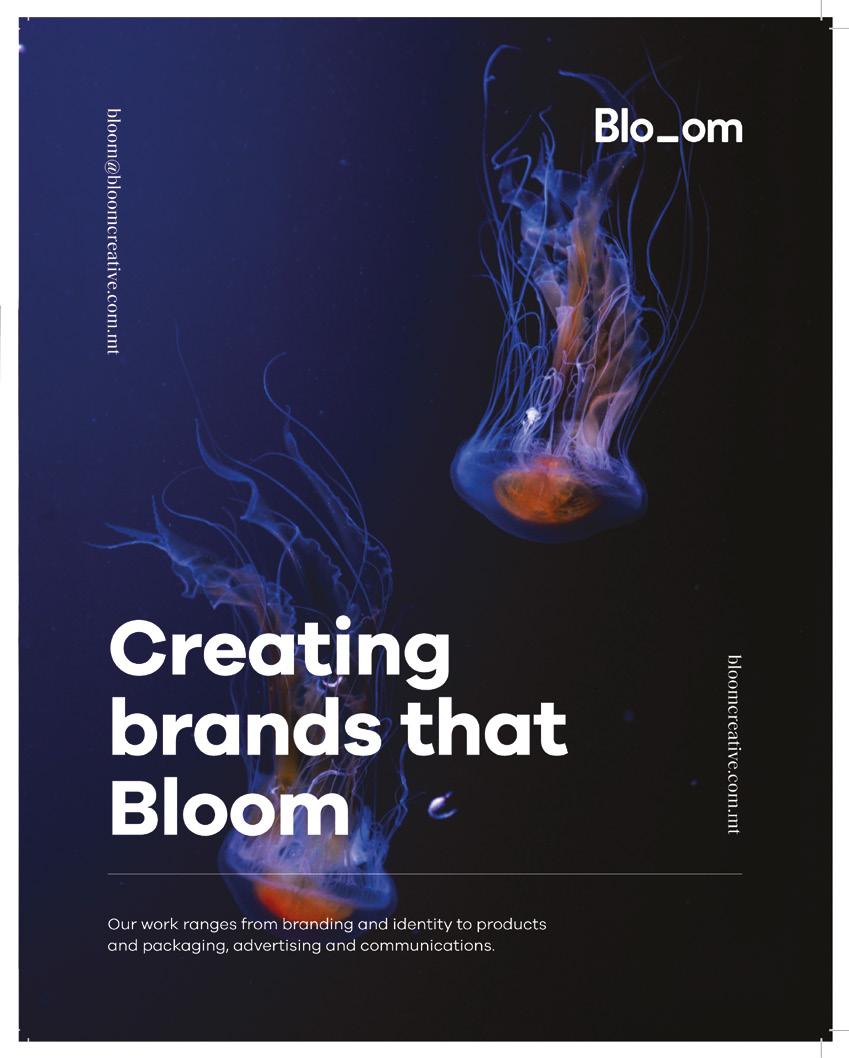
ALPINE EAGLE
With its pure and sophisticated lines, Alpine Eagle offers a contemporary reinterpretation of one of our iconic creations. Its 41 mm case houses an automatic, chronometer-certified movement, the Chopard 01.01-C. Forged in Lucent Steel A223, an exclusive ultra-resistant metal resulting from four years of research and development, this exceptional timepiece, proudly developed and handcrafted by our artisans, showcases the full range of watchmaking skills cultivated within our Manufacture.




































































































